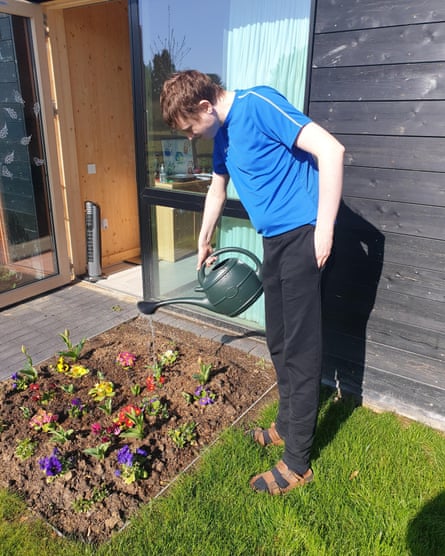Parents across the UK are forming partnerships with local councils to build pioneering supported-living homes for their severely autistic children.
With growing numbers of parents increasingly unable to find suitable, safe and secure residential accommodation for their young adult children – and cash-strapped councils having to pay exorbitant costs when already expensive placements break down – the two are coming together to forge a solution.
The breakthrough is based on the success story of Linden Farm, built by the Simon Trust and Surrey county council, working together in what is thought to be the first venture of its kind.
The Simon Trust was set up after Sally and Peter Lawrence, parents of Simon, were told by their local authority that there was nowhere local for their 25-year-old son to live once he moved out of the residential school that had been his home since he was eight years old.
Refusing to send Simon, whose needs are highly complex, to live in another county, the Lawrences persuaded their council to buy a local 2.4-hectare (6-acre) site. They then formed a charity, raised £250,000 and worked together with the council to create the 10-bed Linden Farm, which offers accommodation, activities and specialised care for severely autistic adults.
“Since setting up Linden Farm, we have been inundated with parents absolutely desperate to find somewhere for their children to go once they enter adult social services,” said Sally Lawrence. “There’s barely anything available across the UK.
“We started putting these parents together, saying that if they were determined, and had a lot of time and energy, they could do what we did.”
Peter Lawrence said it was an “automatic response of social services” to send young adults out of county but it was potentially a recipe for other problems such as poor or inappropriate care.
Mark Nuti, Surrey county council’s cabinet member for adults and health, said: “We’re pleased that Linden Farm has come to fruition and we value our partnership with the Simon Trust.”
The Lawrences are now helping five parent groups to bring similar schemes to fruition.
Sarah, the mother of a severely autistic young adult, recently submitted a proposal to her local council. “My son is severely autistic, nonverbal and has severe learning disabilities,” she said. “It was horrific enough to have to send him, as a seven-year-old, to a different part of the country to live because there was nowhere for him in our county. But now he’s an adult, provision is even worse. There isn’t anywhere suitable.”
Another parent who is also working on a proposal for their council, who asked not to be named, said: “The current situation [in my area] is unbelievably bad for profoundly autistic adults. We’ve got no choice but to create something ourselves.
“There is no money available and everyone we speak to tells of atrocities of autistic folk being placed in unsuitable settings which then break down and end up costing millions in psychiatric care – plus all the trauma associated with that. We’re not prepared to let our child go down that route,” they added.

Fraser Hardie, the chair of the Autism Centre of Excellence in Cambridge, said: “There is a crisis playing out in this country if you’re autistic. In my county, there are between 30 to 50 children who will need this care in the next five years – and literally nothing for them.”
In 2021 the Health Foundation estimated that turning around the crisis in adult social care would cost at least £7.6bn in 2022 to 2023, and £9bn in 2024 to 2025.
Richard Parry, a trustee of the Association of Directors of Adult Social Services, said the government’s autism strategydid not come with any specific additional funding – while promises made in the government’s 2021 white paper, People at the Heart of Care, have recently been broken.
“The government is taking us backwards; £600m has been held back from the £1.7bn of improvement programmes between now and 2025 that the government committed to,” he said.
“This is an area which is generating very significant financial pressure for both adults and children’s social care services. The growing volume of children and young people with complex needs is outstripping the ability to commission arrangements.”
A government spokesperson said: “Our National Planning Policy Framework makes it clear that councils have a duty to assess the type of housing needed for those requiring specialist housing.
“We are committed to increasing the supply of supported housing, and the £11.5bn affordable homes programme includes provision for the delivery of new supported housing.
“Additionally, the care and support specialised housing fund helps fund housing developments across England for those with a range of needs, including people with a learning disability and autistic people.”
Join the exciting world of cryptocurrency trading with ByBit! As a new trader, you can benefit from a $10 bonus and up to $1,000 in rewards when you register using our referral link. With ByBit’s user-friendly platform and advanced trading tools, you can take advantage of cryptocurrency volatility and potentially make significant profits. Don’t miss this opportunity – sign up now and start trading!






Recent Comments